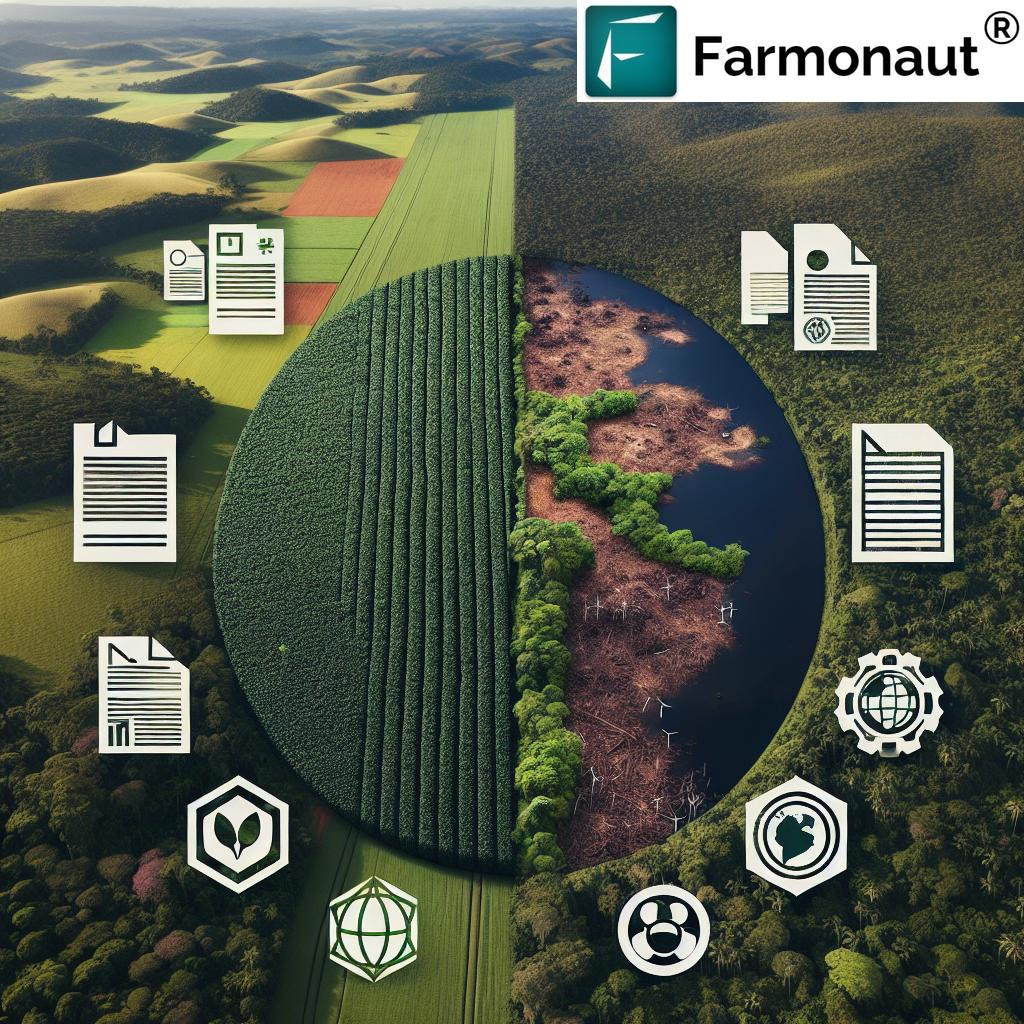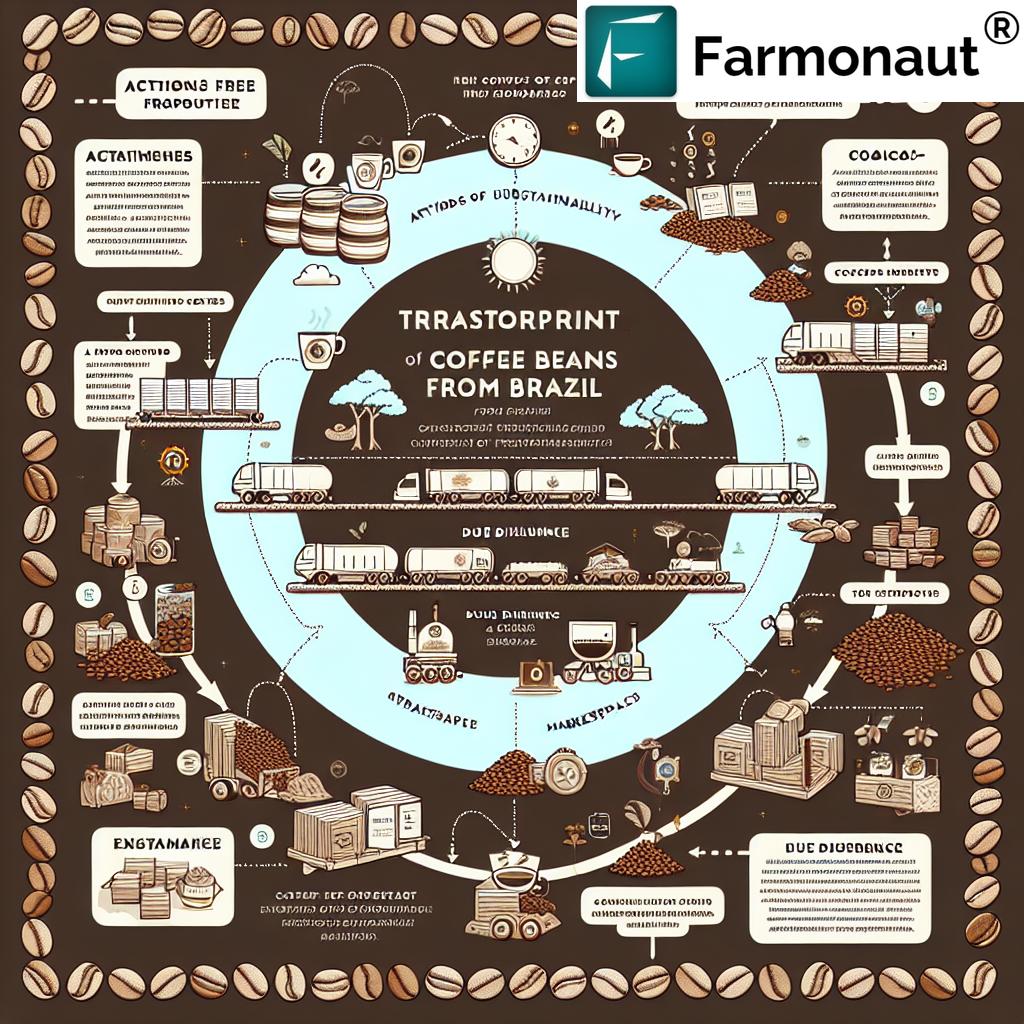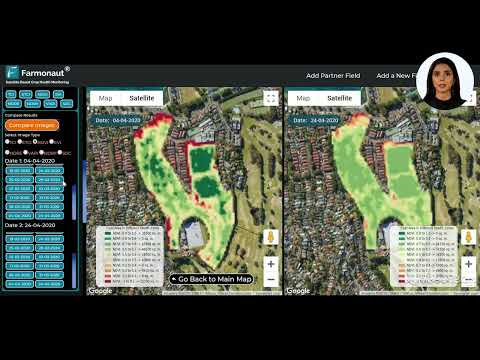EU Deforestation Regulation: How Brazilian Agriculture Can Adapt to New Sustainability Challenges

“The EU Deforestation Regulation affects 7 key agricultural sectors in Brazil, impacting major exports like soybeans and coffee.”
As we delve into the complexities of the European Union’s new Deforestation Regulation (EUDR), it’s crucial to understand its far-reaching implications for Brazilian agriculture and commodity exports. This game-changing policy, set to take effect on December 31, 2024, is poised to transform the landscape of international trade and sustainable farming practices. In this comprehensive analysis, we’ll explore how Brazil, a major player in global agriculture, can navigate these new challenges and potentially emerge stronger in the face of evolving sustainability requirements.
Understanding the EU Deforestation Regulation
The EUDR is a cornerstone of the EU’s Green Deal, aimed at promoting sustainable supply chains and combating global deforestation. Under this regulation, EU importers must provide concrete evidence that their products haven’t contributed to deforestation since January 2020. This requirement applies to a range of commodities crucial to Brazil’s export economy, including soybeans, beef, coffee, cocoa, palm oil, rubber, and wood products.
For Brazil, a country that relies heavily on agricultural exports, the stakes are high. The EU market accounts for approximately 30% of the value of Brazil’s exports in the affected sectors. This new legislation mandates importers to implement a rigorous due diligence system, encompassing risk assessment and compliance reporting. Non-compliance could result in substantial fines and public disclosure of offending suppliers, creating significant pressure on Brazilian producers to adapt their practices swiftly.
Impact on Key Brazilian Agricultural Sectors
Let’s examine how the EUDR is likely to affect seven pivotal sectors in Brazilian agriculture:
| Agricultural Sector | Current EU Export Value (estimated) | EUDR Compliance Readiness | Main Challenges | Potential Opportunities |
|---|---|---|---|---|
| Coffee | $2.5 billion | High | Traceability in complex supply chains | Enhanced market position through sustainability certification |
| Soybeans | $5 billion | Medium | Regulations on legally convertible areas | Development of more sustainable farming practices |
| Beef | $1.2 billion | Low | Addressing indirect deforestation links | Improved cattle tracking and sustainable ranching methods |
| Wood Products | $800 million | High | Maintaining current certification standards | Expansion in eco-conscious markets |
| Cocoa | $150 million | Medium | Smallholder compliance and traceability | Premium pricing for certified sustainable cocoa |
| Palm Oil | $50 million | Low | Historical association with deforestation | Establishing Brazil as a leader in sustainable palm oil production |
| Rubber | $30 million | Medium | Limited current sustainability initiatives | Innovation in sustainable rubber production techniques |
1. Coffee Industry: A Model of Compliance
Brazil’s coffee industry stands out as potentially the least impacted sector, thanks to its strong likelihood of compliance. With over 50% of its exports destined for the EU, the coffee sector has already made significant strides in sustainable practices. However, challenges remain in ensuring complete traceability throughout complex supply chains.
Opportunity: By leveraging existing sustainability initiatives and investing in advanced traceability systems, Brazilian coffee producers can solidify their position in the EU market and potentially command premium prices for certified sustainable coffee.
2. Soybean Sector: Navigating Legal Complexities
The soybean industry, while showing a high compliance likelihood, faces unique challenges. The sector must grapple with regulations concerning legally convertible areas under Brazilian law. With approximately 70% of Brazilian soybeans exported, the impact of the EUDR on this sector cannot be overstated.
Challenge: Balancing the need for agricultural expansion with strict EU deforestation requirements will require careful navigation of both Brazilian and EU regulations.
3. Beef Industry: Overcoming Sustainability Hurdles
As one of the world’s largest beef producers, Brazil’s meat industry faces considerable challenges in EUDR compliance. The sector currently has a lower compliance likelihood score, primarily due to the complex nature of cattle ranching and its historical links to deforestation.
Action needed: Implementing robust traceability systems and sustainable ranching practices will be crucial for the beef industry to maintain its EU market share.
4. Wood Products: Building on Existing Certifications
The wood product sector in Brazil is well-positioned, with 100% of its exports already certified as deforestation-free. This gives the industry a strong regulatory footing under the EUDR.
Opportunity: Leveraging this head start, Brazilian wood exporters can potentially expand their market share in the EU by promoting their established sustainable practices.
5. Cocoa and Rubber: Small but Significant
While cocoa and rubber exports represent a smaller share of trade with the EU, the demand for improved sustainability practices remains relevant. These sectors must adapt to ensure continued access to the European market.
Focus area: Developing sustainable farming practices and enhancing traceability in these sectors could open new opportunities in premium EU markets.
Challenges in Adapting to the EUDR
The road to compliance with the EU Deforestation Regulation is fraught with challenges for Brazilian agriculture. Let’s explore some of the key obstacles:
- Timeline Constraints: Many Brazilian producers have voiced concerns about the limited time to adapt their supply chains to meet the new requirements by December 31, 2024.
- Small Producer Impact: Smaller farmers may be disproportionately affected due to the added costs associated with implementing robust due diligence systems.
- Technological Gaps: Implementing advanced traceability systems across vast agricultural areas poses significant technological and logistical challenges.
- Balancing Growth and Sustainability: Brazil must navigate these regulatory changes while managing its domestic agricultural growth agendas.
To address these challenges, we at Farmonaut offer innovative solutions that can help Brazilian farmers adapt to these new regulations efficiently and cost-effectively.
Opportunities for Brazilian Agriculture
While the EUDR presents significant challenges, it also opens doors to new opportunities for Brazilian agriculture:
- Enhanced Global Competitiveness: By adapting to these stringent standards, Brazilian producers can potentially enhance their competitiveness in global markets, not just in the EU.
- Innovation in Sustainable Practices: The push for compliance can drive innovation in sustainable farming techniques, positioning Brazil as a leader in eco-friendly agriculture.
- Premium Market Access: Certified sustainable products often command premium prices, offering a potential boost to export revenues.
- Improved Environmental Policies: The EUDR could catalyze improvements in Brazil’s environmental policies, benefiting both the agricultural sector and the country’s natural resources.
Farmonaut’s satellite-based crop health monitoring and AI advisory systems can play a crucial role in helping Brazilian farmers achieve these opportunities.
Strategies for Compliance and Adaptation
To successfully navigate the challenges posed by the EUDR, Brazilian agricultural sectors can adopt several key strategies:
1. Invest in Advanced Traceability Systems
Implementing state-of-the-art traceability solutions is crucial for compliance with the EUDR. These systems should track products from farm to export, ensuring transparency and accountability throughout the supply chain.
Farmonaut’s Role: Our blockchain-based traceability solutions can help Brazilian producers implement robust tracking systems, ensuring compliance with EU regulations.
2. Embrace Sustainable Farming Practices
Adopting and expanding sustainable farming methods is essential. This includes practices like agroforestry, crop rotation, and precision agriculture techniques that minimize environmental impact.
Farmonaut’s Contribution: Our satellite-based crop health monitoring and AI-driven advisory systems can help farmers optimize resource use and adopt more sustainable practices.
3. Enhance Collaboration and Knowledge Sharing
Fostering collaboration between different sectors of Brazilian agriculture can accelerate the adoption of best practices and innovative solutions for compliance.
4. Leverage Technology for Compliance
Utilizing advanced technologies like satellite monitoring, AI, and blockchain can significantly ease the compliance process and improve overall agricultural efficiency.
Farmonaut’s Expertise: Our platform integrates these cutting-edge technologies to provide comprehensive farm management solutions tailored to meet EUDR requirements.
The Role of Technology in Compliance
Technology plays a pivotal role in helping Brazilian agriculture adapt to the EUDR requirements. Here’s how various technological solutions can aid in compliance:
- Satellite Monitoring: Provides real-time data on land use changes and crop health, essential for proving non-deforestation claims.
- Artificial Intelligence: AI algorithms can analyze vast amounts of data to predict risks and optimize farm management practices.
- Blockchain Technology: Ensures transparent and tamper-proof record-keeping throughout the supply chain.
- IoT Sensors: Enable precise monitoring of farm conditions, supporting sustainable resource management.
Farmonaut’s comprehensive platform integrates these technologies, offering Brazilian farmers a powerful tool for EUDR compliance and sustainable farm management.
“Brazil has until December 31, 2024 to adapt its agricultural practices to comply with new EU sustainability requirements.”
Economic Implications of EUDR Compliance
The economic impact of adapting to the EUDR will be significant for Brazilian agriculture:
- Short-term Costs: Implementing new systems and practices will require substantial investment.
- Long-term Benefits: Improved sustainability can lead to increased market access and potentially higher prices for certified products.
- Market Diversification: The push for sustainability may open new markets beyond the EU for Brazilian agricultural products.
- Job Creation: New roles in sustainability management and technology implementation may emerge.
While the initial economic burden may be challenging, the long-term benefits of compliance could significantly outweigh the costs.
Policy Recommendations for Brazilian Government
To support the agricultural sector in adapting to the EUDR, the Brazilian government should consider the following policy measures:
- Financial Support: Provide subsidies or low-interest loans to help farmers, especially smallholders, invest in compliance technologies.
- Regulatory Alignment: Align domestic environmental policies with EU standards to simplify compliance for exporters.
- Research and Development: Increase funding for agricultural research focused on sustainable practices and technologies.
- Capacity Building: Implement training programs to educate farmers about EUDR requirements and sustainable farming methods.
- International Cooperation: Engage in dialogues with the EU to ensure fair implementation of the EUDR and potentially negotiate transition periods.
Case Study: Successful Adaptation in the Coffee Sector
The Brazilian coffee industry provides an excellent example of successful adaptation to sustainability requirements. Many coffee producers have already implemented comprehensive traceability systems and sustainable farming practices. This proactive approach has positioned them well for EUDR compliance.
Key Success Factors:
- Early adoption of certification schemes
- Investment in advanced traceability technologies
- Collaboration between producers, cooperatives, and exporters
- Focus on quality and sustainability as market differentiators
Other sectors can learn from the coffee industry’s experience in preparing for the EUDR.
The Future of Brazilian Agriculture Under EUDR
As we look towards the future, the EUDR is likely to reshape Brazilian agriculture in several ways:
- Increased Sustainability Focus: Sustainability will become a core aspect of agricultural operations, not just an add-on.
- Technological Advancement: The sector will see accelerated adoption of advanced technologies for farm management and traceability.
- Shift in Production Patterns: There may be a move towards more intensive farming on existing agricultural lands to avoid deforestation.
- Market Realignment: Brazilian agriculture may see a shift in export destinations, with a greater focus on markets that value sustainability.
These changes, while challenging, present an opportunity for Brazil to cement its position as a leader in sustainable agriculture globally.
Conclusion
The EU Deforestation Regulation represents both a significant challenge and a transformative opportunity for Brazilian agriculture. By embracing sustainable practices, investing in technology, and fostering collaboration across the sector, Brazil can not only meet the EUDR requirements but also enhance its competitiveness in the global agricultural market.
The journey towards compliance will require concerted efforts from farmers, industry associations, technology providers like Farmonaut, and the government. However, the potential rewards – in terms of market access, environmental conservation, and economic resilience – make this adaptation process a crucial investment in the future of Brazilian agriculture.
As we move towards the December 31, 2024 deadline, the actions taken now will shape the future of Brazilian agriculture for decades to come. By rising to this challenge, Brazil has the opportunity to set new global standards for sustainable agriculture, benefiting its economy, its environment, and the world at large.
FAQ Section
Q1: What is the EU Deforestation Regulation (EUDR)?
A1: The EUDR is a new policy by the European Union that requires importers to prove their products haven’t contributed to deforestation since January 2020. It affects key commodities like soybeans, beef, coffee, cocoa, palm oil, rubber, and wood products.
Q2: When does the EUDR come into effect?
A2: The EUDR is set to take effect on December 31, 2024.
Q3: How will the EUDR impact Brazilian agriculture?
A3: The EUDR will significantly impact Brazilian agriculture, particularly sectors exporting to the EU. It requires substantial changes in farming practices, traceability systems, and supply chain management to ensure compliance.
Q4: What are the main challenges for Brazilian farmers in complying with the EUDR?
A4: Key challenges include implementing advanced traceability systems, adapting to sustainable farming practices, managing the costs of compliance, and navigating the complexities of both Brazilian and EU regulations.
Q5: How can technology help in EUDR compliance?
A5: Technologies like satellite monitoring, AI, blockchain, and IoT sensors can aid in tracking land use, optimizing farm management, ensuring supply chain transparency, and demonstrating compliance with EUDR requirements.
Q6: What opportunities does the EUDR present for Brazilian agriculture?
A6: The EUDR offers opportunities for Brazilian agriculture to enhance its global competitiveness, drive innovation in sustainable practices, access premium markets, and improve overall environmental policies.
Q7: How can small farmers adapt to the EUDR requirements?
A7: Small farmers can adapt by joining cooperatives, seeking government support, adopting cost-effective technologies, and participating in training programs on sustainable farming practices.
Q8: What role can the Brazilian government play in facilitating EUDR compliance?
A8: The Brazilian government can support compliance by providing financial assistance, aligning domestic policies with EU standards, investing in research and development, and facilitating international cooperation.
Q9: How might the EUDR affect Brazil’s agricultural export market?
A9: The EUDR may lead to a realignment of export markets, potentially increasing the focus on sustainability-conscious markets and possibly affecting trade volumes with the EU in the short term.
Q10: What long-term impacts might the EUDR have on Brazilian agriculture?
A10: In the long term, the EUDR could lead to more sustainable and technologically advanced agricultural practices in Brazil, potentially strengthening the country’s position as a leader in sustainable agriculture globally.
Earn With Farmonaut
Earn 20% recurring commission with Farmonaut’s affiliate program by sharing your promo code and helping farmers save 10%. Onboard 10 Elite farmers monthly to earn a minimum of $148,000 annually—start now and grow your income!
Learn more about our affiliate program
Farmonaut Subscriptions








